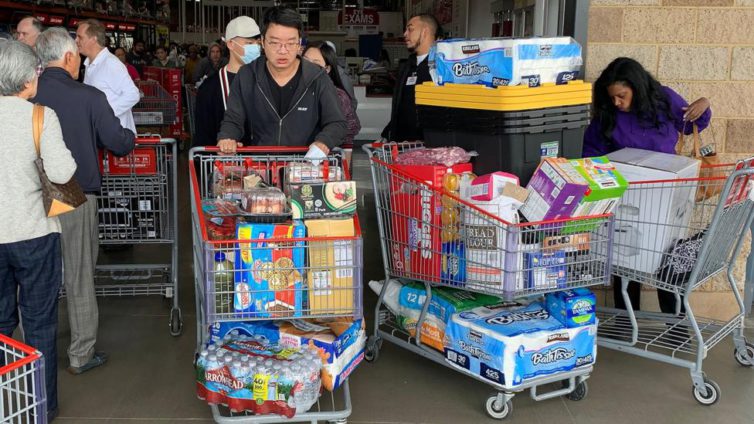Last Saturday afternoon, Kristina Moy decided to swing by her local supermarket in the US city of Seattle to pick up some weekly groceries and supplies for her son’s upcoming baseball tournament.
What started as a quick errand turned into a three-hour ordeal, navigating checkout lanes packed with hundreds of shoppers stocking up amid the outbreak of coronavirus.
Moy, a resident of Washington state, was well aware Governor Jay Inslee had that day declared a state of emergency following the announcement of the first US death related to Covid-19.
“For the most part, people were understanding and relatively calm. But patience was definitely starting to grow thin,” says Moy, who tweeted images of long queues and people with trolleys loaded with bottled water.
“Toilet paper and milk were flying off the shelves faster than I could count, and carbonated water was just about empty.”
Moy isn’t the only one to experience long queues and empty shelves. Mass demand for rice and instant noodles in Singapore prompted Prime Minister Lee Hsien Loong to assure the public there was enough to go around. In Auckland, New Zealand, supermarket spending shot up 40% last Saturday compared to the same day a year ago. And shoppers in Malaysia wanting to pad “pandemic pantries” – grocery hoards to fill people’s kitchens until the crisis dies down – have driven an 800% increase in weekly hand sanitiser sales. (All of those places have confirmed cases of Covid-19.)
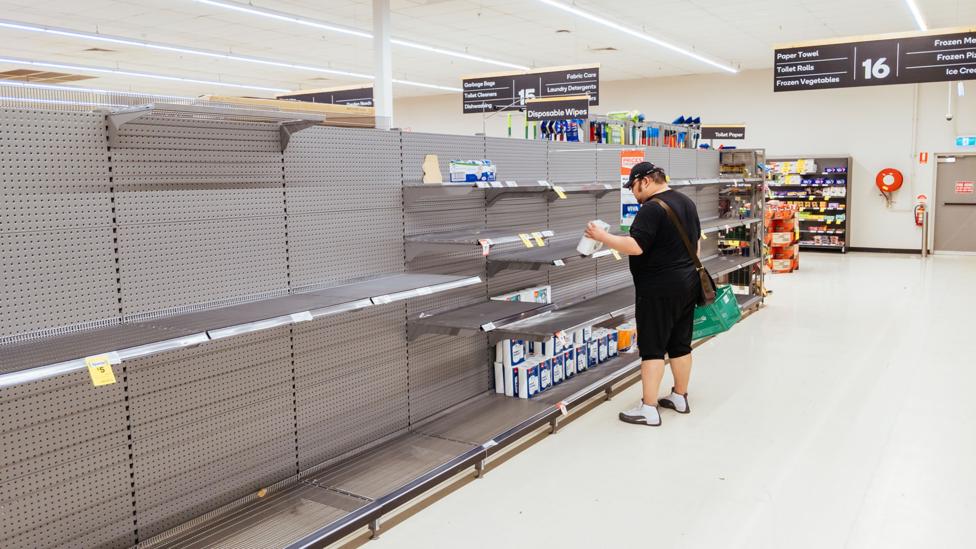
These are the real-world consequences of panic buying – a phenomenon that happens in the face of a crisis that can drive up prices and take essential goods out of the hands of people who need them most (such as face masks for health workers).
So why do people do it? Experts say the answer lies in a fear of the unknown, and believing that a dramatic event warrants a dramatic response – even though, in this case, the best response is something as mundane as washing your hands.
The downsides of panic buying
With events like looming natural disasters, such as a hurricane or flood, people frequently stock up with emergency supplies.
“It is rational to prepare for something bad that looks like it is likely to occur,” says David Savage, associate professor of behavioural and microeconomics at the University of Newcastle in Australia, who’s written about the rationality behind stocking up in a crisis. However: “It is not rational to buy 500 cans of baked beans for what would likely be a two-week isolation period.”
This type of behaviour can make shortages worse – like, for example, when Hurricane Harvey hit oil-rich Houston, Texas in 2017. Precautions taken by refineries, as well as eventual flooding, temporarily stalled the supply of petrol and diesel in the US. That was expected, but the problem got worse when people flocked to petrol stations and panic-filled their cars, contributing to a two-year high in petrol prices.
Irrational stockpiling can also lead to price gouging, says Steven Taylor, a professor and clinical psychologist at the University of British Columbia, and the author of The Psychology of Pandemics. “If the price of a roll of toilet paper is tripled, that’s seen as a scarcer commodity to acquire, which can lead to anxiety,” he says.
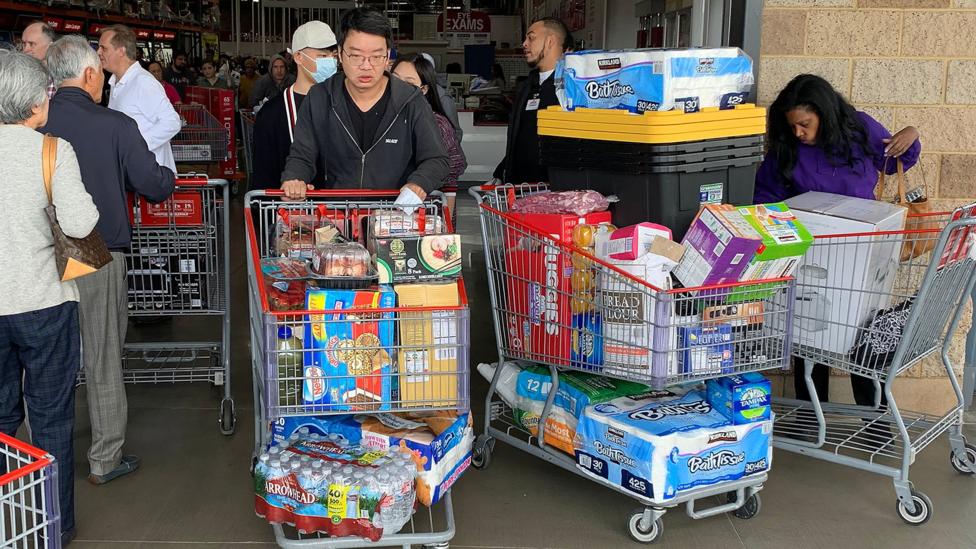
There have been plenty of examples of price gouging in response to Covid-19 – reports have found a 20-pack of face masks costing more than $100 on ecommerce sites such as eBay and Etsy. These high prices have caused companies to put measures in place to stop speculators taking advantage of a spike in demand. On Tuesday, for example, Amazon announced it removed over a million basic-needs products for misleading claims and price gouging. British pharmacy chains Boots and Lloyds Pharmacy both announced on Tuesday that they would restrict sales of hand sanitiser to just two bottles per customer.
The supply of face masks has also been strained. The US government has recommended people stop buying them – not only because surgical masks aren’t sufficient protection from Covid-19, but because there may not be enough for healthcare professionals who need them to do their jobs.
The fact that supply-chain juggernaut China is at the centre of the spread of coronavirus has exacerbated panic buying, says Ben Oppenheim, senior director at San Francisco-based infectious disease research firm Metabiota.
“A lot of the narrative has focused on the disruption of global production and supply chains. There's uncertainty about whether we'll see shortages in medicines, masks and other consumables, and that uncertainty needs to get clarified and addressed,” he says.
The psychology of panic buying
There’s a clear difference between disaster preparation and panic buying, says Taylor.
In the case of a hurricane or flood, most people have a fair idea of the items they may need in the event of a blackout or a water shortage. But since it’s unclear at this stage just what effects Covid-19 will have, there’s a lot of uncertainty driving this spending.
Panic buying, Taylor says, is fuelled by anxiety, and a willingness to go to lengths to quell those fears: like queueing for hours or buying way more than you need.
We’ve seen this before throughout history. Back in 1962 during the Cuban missile crisis, when nuclear war seemed imminent, American families filled their basements with enough canned goods and bottled water to survive an atomic blast.
Then there was Y2K at the turn of the millennium. Amid fears that a catastrophic glitch when computers’ internal clocks reset to “00” for the year 2000 could crash global markets or send missiles flying, people didn’t just hoard lots of nonperishables and bottled water, but money, too – in 1999, the US Treasury was ordered to print an extra $50bn in the expectation that people would withdraw and stockpile cash.
Panic buying helps people feel in control of the situation, experts say.
“Under circumstances like these, people feel the need to do something that’s proportionate to what they perceive is the level of the crisis,” Taylor says. “We know that washing your hands and practicing coughing hygiene is all you need to do at this point.
“But for many people, hand-washing seems to be too ordinary. This is a dramatic event, therefore a dramatic response is required, and so that leads to people throwing money at things in hopes of protecting themselves.”
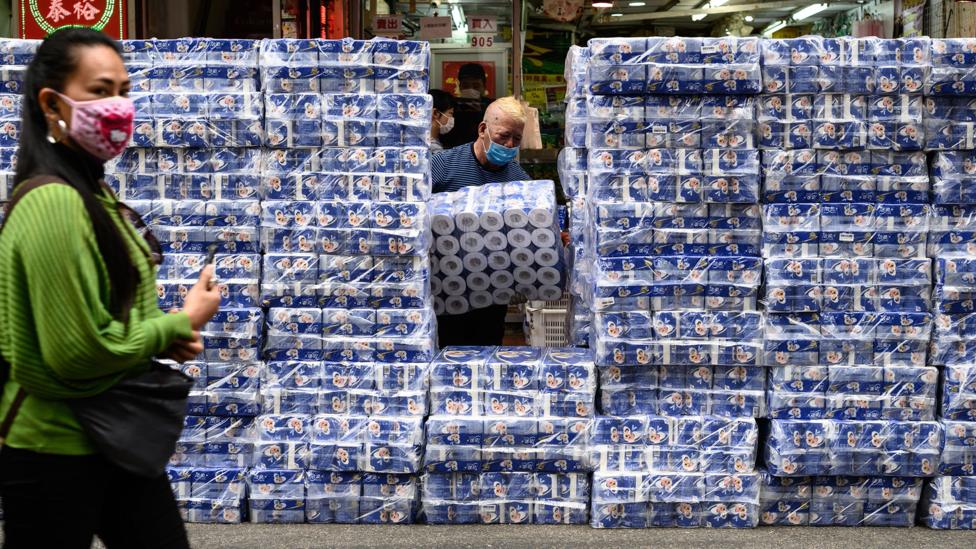
Oppenheim agrees. “It's probably true that panic buying is ultimately a psychological mechanism to deal with our fear and uncertainty; a way to assert some control over the situation by taking an action.”
Savage also points to another principle at play: loss aversion. It’s the idea that you don’t want to miss out. “Losing $100 feels worse than winning $100,” he says. “If we later realise that we needed the toilet paper and we didn’t get it when we had the chance, we will really feel bad.”
Finally, herd mentality also adds to this behaviour. The experts say the fact that panic buying is happening at all can prompt people to participate.
“[Panic buying is] getting excessive play in social media and news media, and that amplifies the sense of scarcity, which worsens the panic buying,” Taylor says. “There’s these snowball effects of a further increased sense of urgency.”
“If everyone else on the Titanic is running for the lifeboats, you’re going to run too, regardless if the ship’s sinking or not,” he says.
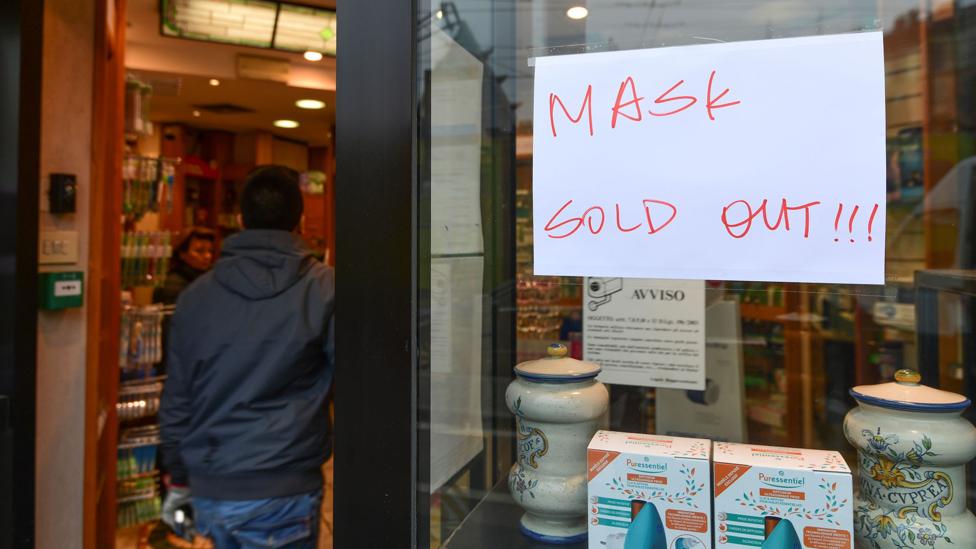
A natural reaction?
Some researchers think the “panic” label used can be a bit misleading, however, and that true “panic” is rare, reserved for situations where death is imminent.
“Panic is a subjective, emotional state, and mostly what we can observe is the behaviour,” says Oppenheim. “Maybe someone reads articles or a couple of tweets about supply chain disruptions in China and mask shortages in Hong Kong, and then makes a very reasoned decision to stock up on masks just in case. All we can infer from the purchasing is the timing, so it could look panicky even if it's well thought through.”
In a 2010 study, Owen Kulemeka of the University of Illinois wrote that panic and antisocial behaviours don’t characterise pre-disaster shopping. Instead, most of these shoppers are simply organised, and “those who delay purchasing cite conflicting information from forecasters and a lack of resources (they fear buying supplies that will be wasted if a storm does not occur) as reasons for waiting until the last minute”. In Hong Kong, some experts posit that panic buying could be what happens when public trust in the government to handle such a crisis hits an all-time low.
In addition, there is continuity to how people react to mass crises, says Helene Joffe, a professor of psychology at University College London.
“In order to face the threatening unknown, people draw on what they already know about seemingly similar threats,” she says. She mentions how some have linked Covid-19 to Sars, a different coronavirus which generated global headlines of its own back in 2003. She points out that there were fewer cases, but more fatalities. “So, links to Sars would attenuate [or] dampen one’s sense of risk. Others have linked it to the Black Death, which, of course, would amplify the sense of risk.”
The critical ingredient is good information, Oppenheim says. “If we can address public fears and uncertainty, we can potentially reduce panic and last-minute buying.”
The alternatives to panic buying
A better plan than panic buying would be to be prepared all year round for possible emergencies or crises. It’s also worth keeping everyone else’s needs in mind as these types of events unfold: stock up on what you and your family need, but avoid the urge to hoard enough supplies to fill a doomsday bunker. Because when individual panic buying plays out collectively, that’s what can lead to price gouging, or low supplies for high-risk individuals who need things like face masks more than the general population does.
It’s also worth noting that quality sources of information are always vital for avoiding rumours and falsities. In Japan, social media rumours erroneously claimed toilet and tissue paper supplies were running low as China would no longer export these products. To stop panic buying, local officials and industry associations had to make statements reminding people that almost all toilet and tissue paper was locally manufactured and there were plenty of supplies.
“Anxiety needs to be acknowledged and managed,” Joffe says. “We do not want complacency, but high levels of anxiety are not useful to prepare [or] prevent catching it.”
Perhaps, if you’re feeling compelled to panic buy, it might be worth asking what it is you’re really afraid of. “If people are really getting distressed and anxious about this, then perhaps they should seek out help from a mental health professional,” Taylor says.
As for the shoppers on the ground who are just trying to do their weekly family grocery run, Kristina Moy in Seattle says she learned the hard way how to deal with the throngs of panic-shoppers in her community.
“Next time, I would definitely wait for the crowds to die down or simply order my supplies from Amazon,” she says. “It was a three-hour experience I really don’t ever want to do again.”
Latest Stories
-
Why Gabon’s coup leader is bucking a trend by embracing democracy
1 hour -
Zimbabwe makes first compensation payments to white farmers over land grabs
1 hour -
Kenya police fire tear gas during school drama competition
2 hours -
Unsecured penguin caused helicopter crash in South Africa
2 hours -
Six dead after helicopter crashes in New York’s Hudson River
2 hours -
US top court instructs Trump to return man deported to El Salvador in ‘error’
2 hours -
WTO says trade between US, China could decrease by as much as 80%
2 hours -
Prince Harry in surprise visit to Ukraine to meet war victims
3 hours -
Michelle Obama dismisses divorce rumours
3 hours -
Cyberattack on Morocco’s CNSS: Initial review finds leaked documents false or distorted
3 hours -
‘Assurance alone is not enough’ – AGI president challenges government to back words with action
4 hours -
Mpatasia galamsey pit responsible for 4 deaths in 4 months, undergoes reclamation efforts
4 hours -
‘Managers of SOEs must skillfully resist political interference’ – Jabesh Amissah-Arthur
4 hours -
Benjamin Asare signs contract extension with Hearts of Oak until 2027
4 hours -
Chaos in Asante Mampong as angry NDC supporters vandalise property, set items ablaze
5 hours

